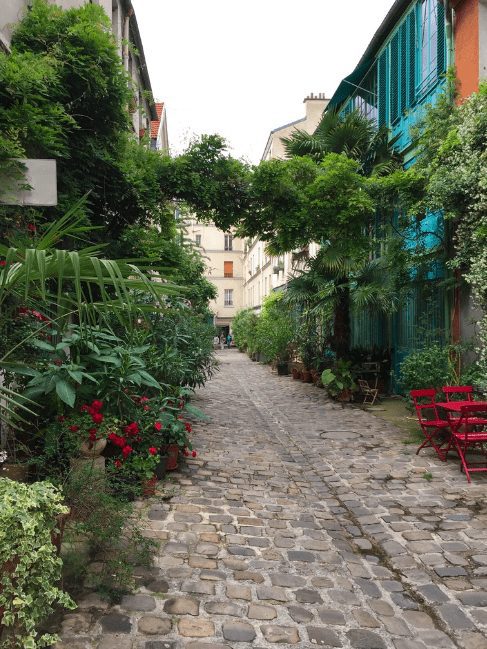Ironically, many the world over think Paris is a synonym for luxury.
Tourists coming from certain states in America, as well as the affluent middle classes of China, Japan and South Korea are likely to have images like this in their minds before visiting Paris for the first time.

Photo credit, Fotographie Link from Pixabay.
The cliché is built by the film industry, reinforced by fashion week, especially Haute Couture and the oldest maison de création.
It’s a funny situation when the myth overtakes reality.
Paris syndrome
You know things have got out of hand when the Japanese name a cultural, psychological condition ‘Paris Syndrome’ ( パリ症候群 ).
The psychological disorder describes the distressing discovery that real life Paris is different to visitors’ expectations.
The shock of this gulf between reality and expectation may lead to psychiatric symptoms such as; delusion, hallucinations, paranoia, anxiety, tachycardia, sweating or vomiting.
Mario Renoux, the president of the Franco-Japanese Medical Association, tried to explain why Japanese tourists fall prey to this disorder in French newspaper, Libération:
“Japanese media, magazines in particular, often depict Paris as a place where most people on the street look like stick-thin models and most women dress in high fashion brands such as Louis Vuitton. In this view, the disorder is caused by positive representations of the city in popular culture, which leads to immense disappointment as the reality of experiencing the city is very different from expectations”.

Photo credit, freestocks.org on Unsplash
Hidden Parisian precarity
In 2012 an Insee survey found that 18,9% of those receiving benefits in Paris, depend on these to make up over 75% of their income.
The research also concluded that Paris was a rare French example of a place where some of the wealthiest and poorest people live in close proximity.

Photo credit, Karin Karin from Pixabay.
We don’t need to rely on statistics to reveal this disparity: As I walk around Paris the number of people you can see going through bins, used to shock me.
This population is not ostensibly homeless, very poor, yes, but do not present as living on the streets. Often they are older people.
Hence the need to provide affordable nutrition, solidarity and support.
First Solidarity Restaurants
It was in 2010 that the mayor of Paris opened 5 restaurants solidaires for those most in need in the 5th, 13th, 10th, 14th and 20th arrondissements.
These restaurants aimed to replace the distribution of food packages « Cœur de Paris » at Père Lachaise, hoping to provide a better quality of nutrition, with points spread out through town, as well as a more welcoming setting for service users.
On March 18th 2013, a 6th address was inaugurated by the mayor of Paris, Bertrand Delanoë. This new spot in the 11th was set up to serve as many as 150 meals from Monday to Saturday between 5:30-8pm.

Bertrand Delanoë, Mayor of Paris 2001-2014. Photo credit, Wiki Commons Media.
The city of Paris opened its next Solidarity Restaurant on January 13th 2014.
It opened its doors at 51, rue des Epinettes in the 17th. Every night, up to 150 people, living in poverty, can come here and enjoy a free meal.
By the end of 2016, there are 9 Solidarity Restaurants in Paris.
How does it work?

Photo credit, Sam Moghadam from Unsplash.
These solidarity restaurants allow many impoverished families to enjoy a free meal, (families represent 20% of diners). There are also homeless men and women who come alone.
Since opening the restaurants served nearly 200 000 meals in one year.
In order to access these restaurants diners hold a monthly card or voucher, given to them by the social services and partner charities. The system allows for better organisation, ensuring that numbers can be managed and those in need can dine in a calm environment.
Addresses & Practical Information
For information and to request a card to access these Solidarity restaurants:
le Centre d’Action Sociale de la Ville de Paris, Sous-direction de la Solidarité et de la Lutte contre l’Exclusion, 5 bd Diderot 75589 Paris Cedex 12.
Tél. 01 44 67 18 21.
NB: These addresses and numbers might be good ones to pass on if you see someone in the street or collecting change in the metro who looks like they could benefit from a free cooked meal.

Photo credit, Discover Walks.
– Boutebrie : 15 rue de la Parcheminerie 75005
RER B Saint-Michel – Notre Dame
Open Monday – Saturday, can sit up to 150 people
– Epinettes : 51 rue des Epinettes 75017
Métro Porte de Saint-Ouen
Open Monday – Saturday, can sit up to 150 people
– Europe : 11 rue de Maleville 75008
Métro Miromesnil
Open Monday – Saturday, can sit up to 150 people
– Vellefaux : 66 av. Claude Vellefaux 75010
Métro Colonel Fabien
Open Monday – Sunday, can sit up to 240 people
– Chanzy : 6 rue de Chanzy 75011
Métro Charonne
Open Monday – Saturday, can sit up to 150 people
– Artistes : 55-57 rue du Montparnasse 75014
Métro Montparnasse-Bienvenue
Open Monday – Sunday, can sit up to 180 people
– Réservoir : 2-4 rue de la Justice 75020
Métro Saint-Fargeau
Open Monday – Saturday, can sit up to 150 people
– Meaux : 72, rue de Meaux 75019
Métro Laumière
Open Monday – Saturday, from 17h15 à 19h15 (closes 19h30)
– Saint Eloi : 10, rue Eugénie-Éboué 75012
Métro Reuilly Diderot
Open Monday – Saturday, from 17h15 à 19h30
How can I help
You might be wondering by now just what you can do to help.
It’s easy to feel helpless and overwhelmed faced with the hunger and homelessness problem in Paris.
If you have a little free time, conversational French and a big heart here are some places you might like to volunteer.
Restos du Coeur
Les Restos du Coeur stand as perhaps one of the most loved French Soup Kitchens and Charities.
Founded by popular comedian Michel Coluche, often simply referred to by his surname, they launched their first campaign back in 1985.

Les restos du coeur. Photo credit, Wiki Commons Media.
Since then they have distributed 8.5 million meals to the hungry and needy.
They are also motivated by helping with the social and economic reintegration of those living in extreme poverty.
If you would be interested in volunteering to help this excellent cause, it’s here.
Pay it back
La Baguette solidaire has taken off in many Boulangeries around Paris. Simply ask at the till for details, although sometimes you might notice a poster or notice advertising it.
Also known as La Baguette Suspendue, the original idea and solidarity statement comes from Naples in Italy, where it is common to order a couple of coffees and just drink one, leaving one on the tab for the next person who might not have the money to buy his or her coffee.
A simple and affordable way to show your solidarity and pay it back!
Cheap Eats Solidarity

Photo credit, Fabian Blank from Unsplash.
Paying Solidarity Restaurants also exist for the general population.
These reasonably-priced addresses can be invaluable for students and pensioners, as well as young French professionals working in the Arts and other low paid industries.
Here you can enjoy the atmosphere of a restaurant, without worrying about a hefty bill landing on your table at the end of the meal.
Bouillon Chartier
Bouillon Chartier is an institution – a traditional French restaurant nestled in the Rue Faubourg Montmartre, behind metro Grands Boulevards.
As the team declare proudly on their website, one does not become a Parisian Legend, in business for over 100 years by pure chance.
In 1896, le Bouillon Chartier was born of a simple idea: that of offering a meal, worthy of that description at a modest price, respecting their customers and winning their loyalty.

Bouillon Chartier, Parisian restaurant in business for 100 years. Photo credit, Wiki Commons Media.
As you can see there is nothing penny pinching about their sumptuous. The waiters are impeccably dressed in waistcoats, bow ties and crisp, white linen aprons.
Yet despite the grandeur of the setting menu prices go something like this:
- Starters from €1
- Main courses between €8.50-13.50 ( including: sea bream in a butter sauce, canard confit, beef tartare )
- Cheese plates are €1.90-2.60
- Desserts €2.20- €4
The restaurant takes no reservations. The only way to eat here is to turn up, then queue up, in what can sometimes be a line stretching some way along the pavement. But it moves quickly and the staff are pros and whisking you to a table and serving quickly.
Bouillon Chartier is open 7 days out of 7 from 11:30am until midnight.
Food Saving Solidarity
Too Good to Go is the new app in Paris allowing environmentally motivated punters on a budget to go and collect produce which otherwise would have been thrown out before closing.

Photo credit, Dan Gold from Unsplash.
It’s an ingenious idea. Framed very much in terms of community and grouping together to prevent waste, a lot of shopkeepers, boulangeries and hotels have signed on, as well as restaurants if it’s a cooked meal you’re after.
The App uses Geolocalisation to suggest sellers in your area who would be happy for you to pass by and collect their unsold perishable produce.
You pay online and simply show the receipt on your phone to whoever is at the till, or the achingly trendy office space in my case when I tested the App.
I went to collect cold pressed juice at Ménilmontant and discovered the most beautiful hidden passageway as well as the lucky lot who get to work here in an open plan ‘pool table in the office’ kind of atmosphere.

Hidden passageway and PAF offices. Photo credit, Kate Reeves.
The only catch is that, quite understandably, it’s the restaurant or shop owner who outlines the window when you should stop by to collect.
This will be planned for practicality around their working day. I think rules are quite strict for latecomers. Choose a place which is easy for you to get to at the appointed time.
Here’s the Link to download the App!
Solidarity as Community

Photo credit, Tim Marshall from Unsplash.
Sometimes Solidarity stands for something bigger.
It could be a cause or passion project, a specific way in which we want to change the world and make our mark.
Here are some examples of some inspiring individuals who are doing just that.
Café Joyeux
Café Joyeux is a very special sort of Solidarity Restaurant and Coffee shop.

Photo credit, Café Joyeux’s Instagram.
Their staff is composed of Baristas living with certain mental disabilities or conditions, such as Down’s syndrome and Autism.
Their mission statement and Solidarity investment is to give dignity and self confidence to those with a mental disability, 90% of whom are unemployed.
Café Joyeux first opened in Rennes. It worked. Now they have two cafés in the capital:
One in the Opéra district at 23 rue Saint Augustin, open from 11:30-6pm Tuesday to Saturday.
The Opéra address would be the perfect place to drop in to refuel after touring the Right Bank.
Their little sister Takeaway only café is at 87 Passage Choiseul
La Résidence
This restaurant came almost organically following the refugee food festival.
Their engagement and sense of Solidarity is to change the perception of refugees, whatever that word means to us, through food.
Here the team behind La Résidence describe their mission:
“Every 2 to 6 months, La Résidence welcomes a new French refugee chef who takes control of the restaurant’s kitchen to share his/her cuisine and the flavors from his/her country of origin with the general public.
Wherever they are from, all the chefs invited to officiate at La Résidence are professional cooks looking for a new experience. This restaurant is destined to be a professional stepping stone: accompanied by chefs Stéphane Jego (L’Ami Jean) and Mohammad Elkhaldy, the guest chefs can use this space to express themselves, test their cooking and refine their talents.”
The food is often bright, colourful and exotic, bringing together a variety of fresh flavours and seasonal produce from Paris with recipes hailing from further afield.
I first discovered this spot at Ground Control, a massive ex-SNCF depot location, which has been transformed into a hip and relaxed summer hangout for young Paris.

Ground Control. Photo credit, Wiki Commons Media.
Nabil Attar, a Syrian chef living in France since 2015 was the first guest refugee chef, using the residency to test out a menu before opening his restaurant in Orléans.
The restaurant is open:
Wednesday -Friday: 12 to 2:30pm // 7 to 10:30pm
Saturday: 12 to 3pm // 7 to 10:30pm
Sunday: 12 to 3pm
Thanks and Sources for this article:
https://www.insee.fr/fr/statistiques/2572750
Planning a trip to Paris ? Get ready !
These are Amazon’s best-selling travel products that you may need for coming to Paris.
Bookstore
- The best travel book : Rick Steves – Paris 2023 – Learn more here
- Fodor’s Paris 2024 – Learn more here
Travel Gear
- Venture Pal Lightweight Backpack – Learn more here
- Samsonite Winfield 2 28″ Luggage – Learn more here
- Swig Savvy’s Stainless Steel Insulated Water Bottle – Learn more here
Check Amazon’s best-seller list for the most popular travel accessories. We sometimes read this list just to find out what new travel products people are buying.











